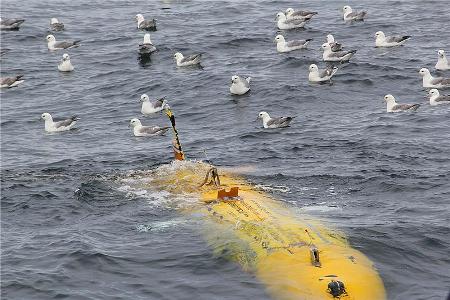By Kalwinder KaurJul 16 2012
The application of robot submarines for mapping and monitoring the seas across the UK have been targeted by two projects. These projects have received £720,000 in funding. As part of investigation, this initiative will collect data regarding future government policy on the protection of the marine environment.
 Fulmars+Autosub
Fulmars+Autosub
Directed by the UK’s National Oceanography Centre (NOC), the research programmes have been contracted by the Department for the Environment, Food and Rural Affairs (Defra). The project will analyze the capabilities and application of the country’s sea glider fleet and autonomous underwater vehicle (AUV). The resulting data will allow the potential application of these submersibles to explore the marine environment.
Owned by the Natural Environment Research Council, NOC has established the MARS (Marine Autonomous and Robotic Systems) facility recently. This facility serves to be the country’s major provider of AUVs and gliders for an extensive marine science community.
The first project has been titled ‘Investigating the feasibility of utilising AUV and glider technology for mapping and monitoring of the UK MPA network’. Funded as part of the Defra Marine Biodiversity Research and Development programme, this £370,000-worth project will be conducted from March to September 2013.
The project basically focuses on reviewing the potential and capabilities of the UK AUV and glider fleet. The case studies demonstrate how the data collected using these instruments will support policy requirements including mapping and monitoring of Marine Protected Areas (MPAs). By collaborating with Scottish Association for Marine Science (SAMS) and British Geological Survey (BGS), NOC is heading this initiative.
The second project entitled ‘Novel AUV and glider deployments to inform future MPA and MSFD monitoring strategy in UK shelf waters’ is scheduled to start during the end of 2012 with anticipated fieldwork during 2013 and 2014. Funded as part of the Defra Strategic Evidence and Partnerships Fund (SEPF), this £350,000-worth project will support new AUV and glider data collection in UK waters during 2013 and 2014. Innovative science under NERC National Capability and Research Programmes will create great impact on policy drivers including the Marine Strategy Framework Directive (MSFD).
Disclaimer: The views expressed here are those of the author expressed in their private capacity and do not necessarily represent the views of AZoM.com Limited T/A AZoNetwork the owner and operator of this website. This disclaimer forms part of the Terms and conditions of use of this website.